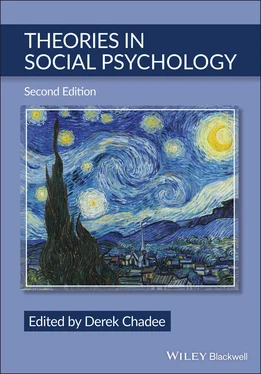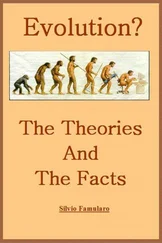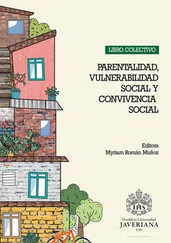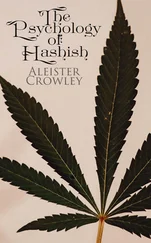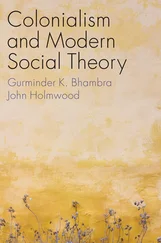Theories in Social Psychology
Здесь есть возможность читать онлайн «Theories in Social Psychology» — ознакомительный отрывок электронной книги совершенно бесплатно, а после прочтения отрывка купить полную версию. В некоторых случаях можно слушать аудио, скачать через торрент в формате fb2 и присутствует краткое содержание. Жанр: unrecognised, на английском языке. Описание произведения, (предисловие) а так же отзывы посетителей доступны на портале библиотеки ЛибКат.
- Название:Theories in Social Psychology
- Автор:
- Жанр:
- Год:неизвестен
- ISBN:нет данных
- Рейтинг книги:5 / 5. Голосов: 1
-
Избранное:Добавить в избранное
- Отзывы:
-
Ваша оценка:
- 100
- 1
- 2
- 3
- 4
- 5
Theories in Social Psychology: краткое содержание, описание и аннотация
Предлагаем к чтению аннотацию, описание, краткое содержание или предисловие (зависит от того, что написал сам автор книги «Theories in Social Psychology»). Если вы не нашли необходимую информацию о книге — напишите в комментариях, мы постараемся отыскать её.
—Robert J. Sternberg,
—Phillip G. Zimbardo, Ph.D., Theories in Social Psychology
Theories in Social Psychology, Second Edition,
Theories in Social Psychology — читать онлайн ознакомительный отрывок
Ниже представлен текст книги, разбитый по страницам. Система сохранения места последней прочитанной страницы, позволяет с удобством читать онлайн бесплатно книгу «Theories in Social Psychology», без необходимости каждый раз заново искать на чём Вы остановились. Поставьте закладку, и сможете в любой момент перейти на страницу, на которой закончили чтение.
Интервал:
Закладка:
200 Steindl, C., Jonas, E., Sittenthaler, S., Traut-Mattausch, E., & Greenberg, J. (2015). Understanding psychological reactance: New developments and findings. Zeitschrift Fur Psychologie, 223(4), 205–214. https://doi.org/10.1027/2151-2604/a000222
201 Stillman, P. G. (1977). Review of the book freedom and reactance. American Political Science Review, 7(2), 673–674.
202 Sukalla, F., Wagner, A. J. M., & Rackow, I. (2017). Dispelling fears and myths of organ donation: How narratives that include information reduce ambivalence and reactance. International Journal of Communication, 11, 5027–5047. https://ijoc.org/index.php/ijoc/article/view/6662/2210
203 Taylor, S., & Asmundson, G. (2021). Negative attitudes about facemasks during the COVID-19 pandemic: The dual importance of perceived ineffectiveness and psychological reactance. PloS One, 16, 2. https://doi.org/10.1371/journal.pone.0246317
204 Thrasher, J. F., Swayampakala, K., Borland, R., Nagelhout, G., Yong, -H.-H., Hammond, D., Bansal-Travers, M., Thompson, M., & Hardin, J. (2016). Influences of self-efficacy, response efficacy, and reactance on responses to cigarette health warnings: A longitudinal study of adult smokers in Australia and Canada. Health Communication, 31(12), 1517–1526. https://doi.org/10.1080/10410236.2015.1089456
205 Tucker, R., & Byers, P. Y. (1987). Factorial validity of merz’s psychological reactance scale. Psychological Reports, 61, 811–815. https://doi.org/10.2466/pr0.1987.61.3.811
206 Ungar, N., Sieverding, M., Schweizer, F., & Stadnitski, T. (2015). Intervention-elicited reactance and its implications: Let me eat what I want. Zeitschrift Für Psychologie, 223(4), 247. https://doi.org/10.1027/2151-2604/a000226
207 Valkenburg, P. M., Piotrowski, J. T., Hermanns, J., & De Leeuw, R. (2013). Developing and validating the perceived parental media mediation scale: A self-determination perspective. Human Communication Research, 39(4), 445–469. https://doi.org/10.1111/hcre.12010
208 Van Petegem, S., Soenens, B., Vansteenkiste, M., & Beyers, W. (2015). Rebels with a cause? Adolescent defiance from the perspective of reactance theory and self-determination theory. Child Development, 86(3), 903–918. https://doi.org/10.1111/cdev.12355
209 Wehbe, M. S., Basil, M., & Basil, D. (2017). Reactance and coping responses to tobacco counter-advertisements. Journal of Health Communication, 22(7), 576–583. https://doi.org/10.1080/10810730.2017.1329853
210 Wicklund, R. A. (1970). Prechoice preference reversal as a result of threat to decision freedom. Journal of Personality and Social Psychology, 14(1), 8–17. https://doi.org/10.1037/h0028619
211 Wicklund, R. A. (1974). Freedom and reactance. Erlbaum.
212 Wicklund, R. A. (1997). The theory of psychological reactance: A reliably revolutionary perspective. Contemporary Psychology, 42(8), 679–681. http://dx.doi.org/10.1037/000134
213 Worchel, S. (1974). The effects of three types of arbitrary thwarting on the instigation to aggression. Journal of Personality, 42(2), 300–318. https://doi.org/10.1111/j.1467-6494.1974.tb00676.x
214 Worchel, S. (2004). The diamond in the stone: Exploring the place of free behavior in studies of human rights and culture. In S.Wright, J.Greenberg, & S.Brehm (Eds.), Motivational analyses of social behavior: Building on Jack Brehm’s contributions to psychology (pp. 107–128). Erlbaum.
215 Worchel, S., & Andreoli, V. A. (1974). Attribution of causality as a means of restoring behavioral freedom. Journal of Personality and Social Psychology, 29, 237–245. https://doi.org/10.1037/h0036012
216 Worchel, S., & Brehm, J. W. (1971). Direct and implied social restoration of freedom. Journal of Personality and Social Psychology, 18(3), 294–304. https://doi.org/10.1037/h0031000
217 Worchel, S., & Brehm, J. W. (1970). Effect of threats to attitudinal freedom as a function of agreement with the communicator. Journal of Personality and Social Psychology, 14(1), 18–22. https://doi.org/10.1037/h0028620
218 Wright, R. A., & Brehm, S. S. (1982). Reactance as impression management: A critical review. Journal of Personality and Social Psychology, 42(4), 608–618. https://doi.org/10.1037/0022-3514.42.4.608
219 Wright, R. A., Agtarap, S. D., & Mlynski, C. (2015). Conversion of reactance motives into effortful goal pursuit: Implications of Brehm’s theory of motivation intensity. Zeitschrift Für Psychologie, 223(4), 267–276. https://doi.org/10.1027/2151-2604/a000228
220 Wright, R. A., Greenberg, J., & Brehm, S. S. (Eds.). (2004). Motivational analyses of social behavior: Building on Jack Brehm’s contributions to psychology. Erlbaum. https://doi.org/10.4324/9781410610089
221 Wright, R. E., & Palmer, J. C. (2012). Reactance and behavioral change: Marketing healthy lifestyles. The Journal of Applied Business and Economics, 13(4), 136–143. http://www.nabusinesspress.com/JABE/WrightRE_Web13_4_.pdf
222 Xu, J. (2015). Designing messages with high sensation value: When activation meets reactance. Psychology & Health, 30(4), 423–440. https://doi.org/10.1080/08870446.2014.977280
223 Xu, J. (2017). The Impact of Locus of Control and Controlling Language on Psychological Reactance and Ad Effectiveness in Health Communication. Health Communication, 32(12), 1463–1471. https://doi.org/10.1080/10410236.2016.1230807
224 Zajonc, B. (1980). Feeling and thinking: Preferences need no inferences. American Psychologist, 35(2), 151–175. https://doi.org/10.1037/0003-066X.35.2.151
225 Zhang, Q., & Sapp, D. (2013). Psychological reactance and resistance intention in the classroom: Effects of perceived request politeness and legitimacy, relationship distance, and teacher credibility. Communication Education, 62(1), 1–25. https://doi.org/10.1080/03634523.2012.727008
Конец ознакомительного фрагмента.
Текст предоставлен ООО «ЛитРес».
Прочитайте эту книгу целиком, купив полную легальную версию на ЛитРес.
Безопасно оплатить книгу можно банковской картой Visa, MasterCard, Maestro, со счета мобильного телефона, с платежного терминала, в салоне МТС или Связной, через PayPal, WebMoney, Яндекс.Деньги, QIWI Кошелек, бонусными картами или другим удобным Вам способом.
Интервал:
Закладка:
Похожие книги на «Theories in Social Psychology»
Представляем Вашему вниманию похожие книги на «Theories in Social Psychology» списком для выбора. Мы отобрали схожую по названию и смыслу литературу в надежде предоставить читателям больше вариантов отыскать новые, интересные, ещё непрочитанные произведения.
Обсуждение, отзывы о книге «Theories in Social Psychology» и просто собственные мнения читателей. Оставьте ваши комментарии, напишите, что Вы думаете о произведении, его смысле или главных героях. Укажите что конкретно понравилось, а что нет, и почему Вы так считаете.
